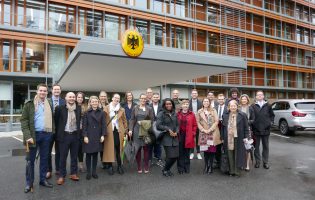
Electoral Uncertainty in a Changing Saxony
On September 1, voters in the eastern state of Saxony will be headed to the polls to elect a new state government. In making their choice, voters will have to …

Blockchain: Chained Up by Legal Issues
The German government acknowledges that interest in blockchain technology is growing rapidly and new applications are emerging almost daily. Blockchain as a technology even made it into the German CDU/SPD …

Elections in Thuringia: Can Ramelow’s Coalition Hold On?
On October 27, voters in the eastern German state of Thuringia will head to the polls. In Thuringia’s last election, which took place in 2014, a left-wing “red-red-green” coalition was …

The 9 Percent Trap: The German Left’s Identity Crisis
The German Left Party is in the midst of yet another crisis. Party chairperson Katja Kipping has been openly deliberating resignation; the co-founder and influential former Social Democrat Oskar Lafontaine …
Episode 11: Inequality and Social Division: An Economic Perspective
Globalization and technological change have reshaped the world economy and have been vital sources of economic growth and prosperity in the United States and Germany for a decade. Yet polarization …
Recent Authors
AGI provides knowledge, insights, and networks as tools to solve the challenges ahead.
Support Our WorkThe Future of the Society, Culture & Politics Program
Senior Fellow and Director of the Society, Culture & Politics Program Dr. Eric Langenbacher lays out his vision for the future of the program.

Democracy and the Double Standard: European Parliament Responses to Ursula von der Leyen
Feminist scholars on both sides of the Atlantic have long assumed that there is a positive correlation between women’s numerical presence in legislative bodies (descriptive representation) and their ability to …

Democrats Give Glimmer of Hope to Europe in First Debate: But Is It Enough?
Since Donald Trump’s election in 2016, American transatlanticists have been repeating the phrase “the U.S. is more than just the president,” to their allies across the ocean. “Look to Congress,” …

A Tale of Two Futures
The Future of Work Debate in Germany and the United States From Berlin to Washington, public debates about the future of work is omnipresent. Policymakers, business leaders, unions, and academics …






